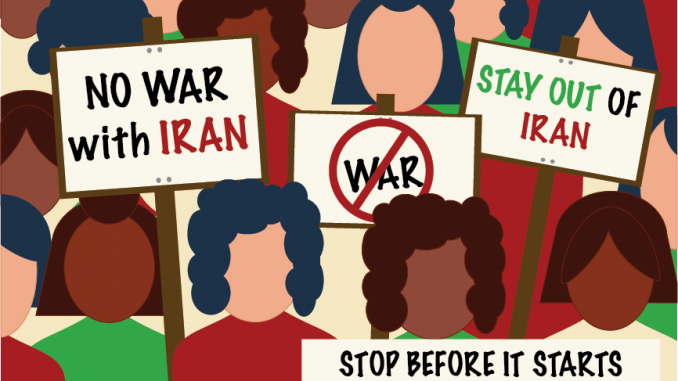

On Jan. 2, United States President Donald Trump issued an airstrike killing Iranian General Qassem Soleimani at Baghdad International Airport, the New York Times reported.
I’ll never forget the chilling feeling of confusion and fear that brushed over me at the time. The more news reports I read, the more I questioned what this could mean — not only for our nation, which comes closer to global war with Iran every day, but also for the hundreds of thousands of Iranians and Iranian Americans living in the U.S., according to the Associated Press.
They’re my peers, neighbors and classmates, all of whom are placed in a greater threat following Trump’s increasingly hostile conflict with Iran.
“I was just scared, I didn’t know what was gonna happen next,” said Rojin Baniasadi, a junior biochemistry major and an Iranian American student. “It feels pretty personal because the two countries that are very important to me are just like going at it.”
There are approximately 4,200 people of Iranian ancestry living in the Philadelphia region, according to the Philadelphia Inquirer. Additionally, there are about 40 international students from Iran who attend Temple University, as well as a number of Iranian-American students, wrote Martyn Miller, assistant vice-president of the Office of International Affairs, to The Temple News.
But given the nation’s history of antagonistic immigration policies toward Iranians during periods of conflict with Iran, I’m worried about Iranian students at my school and in my community: their safety, security and ability to study in this nation.
Notably, in September 2017, Trump issued an executive order barring immigration into the U.S. from five countries with Muslim-majority populations, including Iran, Politico reported. Trump has since considered adding seven more Muslim-majority countries to this “travel ban” in the days following his assassination of Soleimani, the Associated Press reported.
The number of F-1 student visas issued to Iranians decreased from their peak of 3,280 in 2014 to only 1,433 in 2018, a year after the travel ban was issued, Public Radio International reported.
“In terms of the immigration and the visiting policies, unfortunately that’s something that I think a lot of Iranian-Americans are all too familiar with,” said Mona Hedayatfar, a senior psychology major and an Iranian-American student. “I can’t speak for every Iranian-American, but I can say that for me and the people close to me, who can’t come to the states and visit, which creates difficult trying to see your family members or your friends from Iran.”
In September 2019, approximately 20 Iranian students were accepted into graduate schools in the U.S., but had their visas inexplicably revoked by the U.S. government without any stated reasoning, the Los Angeles Times reported. The sudden cancellation of these visas came amid the Trump administration’s escalating conflict with Iran, including the prospect of possible military conflict in the Persian Gulf, the LA Times further reported.
“It’s just sad, disappointing, and I’m just angry. Like what is our people’s fault?” Baniasadi said. “They’re not gonna let Iranians in, and for what? They completely forget about the people and just think about the government, and it’s upsetting.”
Most recently, more than 60 Iranians and Iranian-Americans were subject to lengthy interrogations and delays while trying to re-enter the U.S. at the Washington-Canada border on Jan. 6, only days after Trump’s airstrike against the Iranian general, the Guardian reported.
“I think that incident is quite problematic but also symptomatic of what often happens domestically after there’s some big foreign policy blow-up. I mean just think about the spike in hate crimes against Muslim Americans and Arab-Americans after 9/11,” said Sean Yom, a political science professor at Temple who researches and teaches topics surrounding Middle Eastern politics.
Islamophobic hate crimes increased dramatically in the weeks following the Sept. 11, 2001, terrorist attacks, growing from 28 in 2000 to 481 in 2001, according to a 2016 report by PRI. In the decade since 9/11, reported hate crimes against Muslims have remained above 100 every year, never returning to their pre-2001 rates.
“Whenever we do have potential conflicts and potential bloodshed against foreign foes like Iran, I think it’s inevitable that that’s going to bleed over to increased distrust and hostility to those who appear to be Iranians in the U.S. or entering the U.S.,” Yom said.
While it is speculative to discuss what might happen to Iranians living and studying in the U.S. following Trump’s airstrike against Soleimani, it’s nevertheless a necessary discourse. Historically, our government has demonstrated that in times of conflict, they’re willing to detain, victimize and deny entry to innocent human beings for the sake of a political agenda.
“I’m Iranian and American, and both of the governments I feel don’t really represent the people,” Baniasadi said.
Our government needs to understand that their actions, especially as they relate to conflict with other nations, affect the daily lives of individuals in this nation and abroad in significant and detrimental ways. With a university that has a number of Iranian students, we need to stand in solidarity with them in the coming months as tensions with Iran seem to only grow more hostile.
“I hope people in America who don’t really think about Iran or the Iranian people too much, I hope that they take into account the humanity of people living in other countries,” Hedayatfar said. “These are real people you’re talking about with family, friends, jobs and livelihoods.”


Be the first to comment